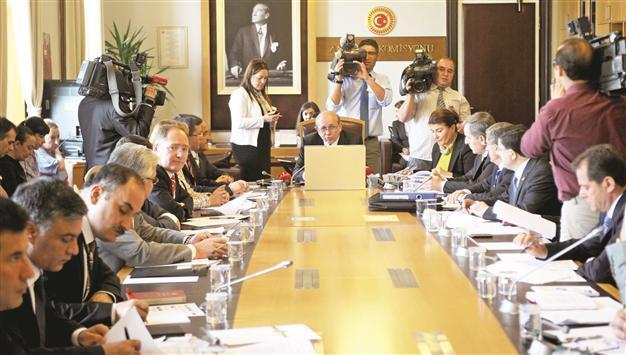No breakthrough on use of mother tongue in Commission
ANKARA - Hürriyet Daily News

The BDP’s proposal to add a phrase allowing a ‘preferred language’ to be used for defense in courts was given the cold shoulder by the other three parties on Parliament’s charter panel. AA photo
As members of the Parliament’s Constitution Conciliation Commission have been deadlocked on several articles concerning the right to use one’s mother tongue, representatives of four political parties at the Commission preferred to skip the issue of “the right to a defense in mother tongue” in order to leave room for debate on less contentious issues.The Peace and Democracy Party (BDP) insists that there should be a “preferred language” phrase for defense in courts, while the other three parties, including the ruling Justice and Development Party (AKP), suggest that anyone who can speak Turkish defend themselves in Turkish. The article was suspended and left to the end of the related chapter.
Daily Bugün reported yesterday that the charter panel agreed on the “right to a defense in a language one can understand,” which led to a misunderstanding that the commission enabled defense in mother tongue. “The right to defense in mother tongue” has been a contentious issue especially after the trials of Kurdistan Communities Union (KCK), which is the alleged urban link of the outlawed Kurdistan Workers’ Party (PKK), started. The suspects have requested to plea in Kurdish, but the courts refused to take their defense in their mother tongue and considered them absent when they attempted to plea “in a language other than Turkish.”
While “the right to defense” was being discussed at the commission last month, Altan Tan from the BDP demanded “the right to a defense in Kurdish” saying: “There should be a ‘preferred language’ phrase for defense in courts. As the BDP, we cannot give up on that.” However, all three other parties at the panel objected to this demand with the Nationalist Movement Party (MHP) the most reactive on the issue. A panel member from MHP, Oktay Öztürk said that they are totally against a “preferred language” phrase to the article. “This would mean creating a new nationality. We have taken an oath on our constitution,” Öztürk said.
“The BDP advocates that there should be a preferred language phrase for defense in courts. But we don’t accept it. Turkish is the official language in courts and other state institutions, and defense should be in a language one can understand,” Atilla Kart, a panel member from main opposition Republican People’s Party told the Daily News, adding that the AKP, CHP and MHP agreed on that but the BDP disagreed.
BDP ASKS FOR OR RECESS IN COMMISSION
ANKARA
Expressing resentment over other parties’ disregard for their contributions to the ongoing drafting of a new constitution, the Peace and Democracy Party (BDP) yesterday appealed for a 10-day break in the work in order to review the process.
“The proposals we have brought [to the panel] during the process of drafting the new constitution are not being debated. Representatives of the other three parties are passing over our proposals saying ‘Let’s put those [proposals] in parentheses.’ If a person cannot express his opinion in his own mother tongue, then how can he do it? How can [the issue of the use of languages other than Turkish] divide this country? We are wondering how we can draft a new constitution in this environment,” the BDP’s Sırrı Süreyya Önder said at a press conference in Parliament following yesterday’s session of the Parliament’s Constitution Conciliation Commission. The BDP is not planning to withdraw from the process, Önder said, adding that the BDP will hold a camp to discuss party policies from July 17-20, and they will debate the issue in detail at this camp.
During last Friday’s meeting on the article covering crimes and penalties, BDP requested the inclusion of an item stating: “It is banned to destroy the identity of arrested or convicted persons or to isolate such persons in order to reduce their physical and mental capacity.” All of the other members of the commission objected to the item.
















